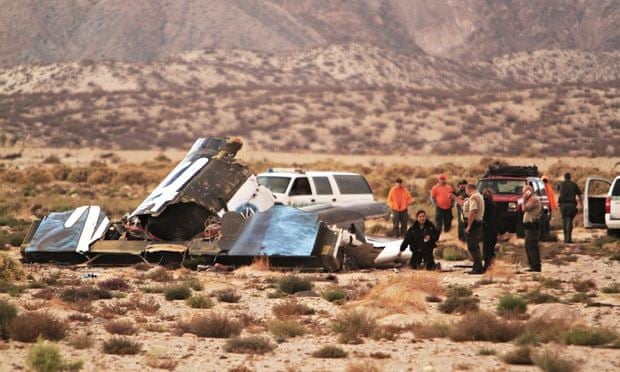
Personnel examine pieces of 'SpaceShip Two' in the Mojave Desert.
The news that Richard Branson's pet space ship ('Space Ship Two')- to which over 500 celebs have already signed up - has crashed in a test run, ought to surprise no one. As I glimpsed the wreckage of Virgin Galactic's downed craft on the nightly news I realized again how these relatively small entrepreneurial outfits (even backed by billionaires) are simply not up to the task of space exploration or even nominal space tourism. In Branson's case, it was to give wealthy hotshots a chance to say they'd at least been to the edge of space (to experience weightlessness) at a quarter million a pop. The total duration of each flight? Five minutes.
Must be nice to be able to burn a quarter million for a 5 minute romp just to say you've nominally been to space!
However, the crash of the Galactic craft in this test run shows it's far from ready and surely the crash scene ought to have opened the eyeballs of all those celebs dying to get aboard. Let's also remind ourselves this outcome is even after ten years of development. I suspect the wannabe space men like Ashton Kutcher and Leonardo diCaprio may well have to wait at least another ten years and maybe even more.
Loren Thompson, an analyst at Virginia's Lexington Institute, who's consulted for Boeing and Lockheed Martin, has put it bluntly in a recent Financial Times piece (Oct. 31):
"What we're learning is that consistent success in launching space vehicles requires a much bigger investment of time and money than most entrepreneurs are willing to make".
Duh! This has been exactly my point for the past three years, since the retirement of the Shuttle - at least for cargo shuttling purposes to the ISS. But the entrenched optimists who run these small time commercial outfits simply refuse to accept it. Refuse to accept you ain't going to the Moon, far less Mars, or even to the space station by using relative chump change operations (maximal outlays on the order of $10m or so when the Shuttle program exceeded $300 b) and minimal resources. You need instead the resources of a whole nation and that's why the key successful space missions now are compliments of national efforts (e.g. China and India), not private company efforts.
That so many people of even above average intelligence can't process this or accept this is simply amazing, but perhaps speaks to the overwhelming power of PR and manufactured malarkey dominating today's 24/7 news cycle. And so, one must not be too surprised that too often PR can gut and overcome rational and analytical critical thinking faculties. We saw it already last November as the blow-dried pipsqueaks across mainstream TV tried desperately to get viewers to bite on the "Oswald dunnit" myth to explain the Kennedy assassination during the 50th anniversary of that event.
Now, they're expected to bite on the moronic canard that entrepreneurs like Richard Branson, or small scale commercial startups like Space -X can revive the nation's dormant space program.
Meanwhile, company spokesman George Whitesides had this to blog after the crash, and the news that one of the test pilots died and the other is critically injured:
"Space is hard. Today was a tough day."
You think? .How about this? Space is indeed hard for small entrepreneurial operations and their owner buffoons trying to fool themselves by thinking they can accomplish what it took entire national efforts to do earlier. But hell, don't take my word. Tom Bower, a biographer of Branson quoted in today's UK Guardian, said the rocket being used by Galactic was “very crude”. He claimed engineers working on the project had told him the craft was “very dangerous”.
Hubris anyone? Any of those stars lined up for a space ride still interested? Or are you like the morons signed up for the one way 'Mars One' suicide mission? (See e.g. http://www.mars-one.com/ )
Also quoted in the Guardian is John Logsdon, retired space policy director at George Washington University, who said:
“It’s a real setback to the idea that lots of people are going to be taking joyrides into the fringes of outer space any time soon. There were a lot of people who believed that the technology to carry people is safely at hand.”
Indeed, and they were total delusionary dreamers too overtaken by corporate PR and without enough critical thought to compensate.
No comments:
Post a Comment